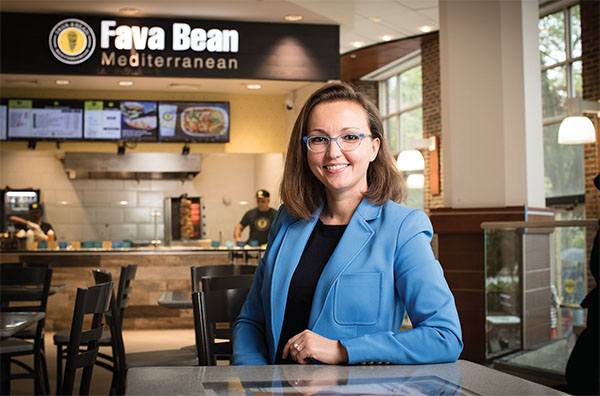When Julia Kokina was about 10 years old, she decided she had to learn English. Her native language is Latvian, and with a mother from St. Petersburg, she also speaks fluent Russian. But her parents, who love music, often would listen to American artists such as Stevie Wonder, Paula Abdul, and Michael Jackson. “I always wondered what the heck they were saying,” says Kokina, assistant professor of accounting.
So Kokina asked her parents for a tutor. Eventually, she studied English in school as well. “But for a couple of summers, all I remember is me and my English tapes and listening to the BBC radio a lot,” she says.
Coming from a family of educators, Kokina grew up in an atmosphere where curiosity and learning were encouraged. Her father was a teacher and then principal at a vocational school. “My favorite memory from childhood is my father taking me to his class, and it was all boys,” she says. “I really felt special when I was the little kid sitting at his desk, and he was showing me around.”
Her sister, who is 14 years older, was actually her teacher one year in elementary school. Her mother, an economist, instilled in Kokina a passion for math. A desire to learn about new cultures brought Kokina to El Paso, Texas, on a Rotary exchange program for her senior year. Even the parents of her U.S. “family” were educators. “Education has shaped my life in a big way,” she says.

Photo: Tom Kates
Julia Kokina, assistant professor of accounting, at Fava Bean Mediterranean, the restaurant she co-founded with her husband.
Entrepreneurship also intrigued Kokina from an early age. In Latvia, she saw her country gain independence from the Soviet Union in the early 1990s. Afterward, many people started businesses, and Kokina saw how those ventures positively affected their lives. Later, as a student in El Paso, she noted how entrepreneurship and small businesses helped shape the communities on the border of the U.S. and Mexico.
“I saw how entrepreneurship can change lives,” she says, which prompted her interest in studying business and accounting. But instead of heading back to Latvia for college, Kokina, who liked her independence and wanted to continue exploring new cultures, decided to study at the University of Texas at El Paso (UTEP).
Her sophomore year turned out to be pivotal. Juarez, Mexico, which borders El Paso, was dubbed the violence capital of the world that year, Kokina says. She and fellow students staged events for V-Day, the global movement aimed at ending violence against women. “We were staging protests on the border and raising money for shelters,” she says. “I continued that kind of work throughout college.” Kokina also founded a Rotaract club on campus and met her future husband. “It was probably the most monumental year of my life,” she says.
Working with shelters, Kokina found herself thinking entrepreneurially about how to raise money for them. She set up huge garage sales, receiving items from the entire Rotary community in El Paso, and donated the proceeds to shelters. She also started a greeting card project, asking children at a shelter to draw cards, finding a volunteer designer to help create the cards, and then printing and selling them. Again, all proceeds went to the shelter.
Upon finishing her undergraduate degree, Kokina decided to continue her education at UTEP, earning a master’s and becoming a CPA. While studying, she took a job as a tax accountant and then senior auditor, for which she helped train employees. Something clicked. “That’s when I realized I enjoy teaching,” she says, and so she decided to stay even longer at the university and earn a PhD in international business.
In 2014, nine years after arriving in the U.S., Kokina finished her studies and had seven job offers. She chose Babson because of its focus on entrepreneurship. Now as a member of the accounting division, conducting research and teaching courses in an entrepreneurial environment, Kokina has a job that encompasses all of her passions.
Kokina researches innovations and emerging technology in accounting, so she explores such topics as analytics, artificial intelligence, and blockchain technology. “You have to follow up on what the industry is doing,” she says. “You’re not just preparing students to pass an exam. You’re preparing them for when they walk into a company and are expected to know these technologies and recognize opportunities for them.”
This fall, her classes include “Accounting Analytics,” which she helped develop for the MS in Accounting. The course examines such topics as how a company would use analytics to evaluate its performance. “That might involve figuring out which metrics determine your performance, and how you would develop systems of measuring financial and non-financial performance,” she says.
The entrepreneurial spirit still lives within Kokina as well. In June 2016, she and her husband opened Fava Bean Mediterranean, a fast-food restaurant in Cambridge, Massachusetts, that focuses on cuisine from the Middle East, including Yemen, the homeland of her husband’s family. “My husband’s family is in the restaurant business,” Kokina says, “and he has always had a dream of being his own boss. My involvement has been research, development, financial analysis, strategic thinking, and constant support.”
Kokina shares what she learns from the business with her classes, and sometimes she seeks advice from her students. “I might ask them, what do you think about Snapchat? Will this work with your population?” she says.
Being a professor is exciting, says Kokina. “The opportunity to learn,” she says, “and to keep up with what’s going on—it’s fulfilling and motivating.”
